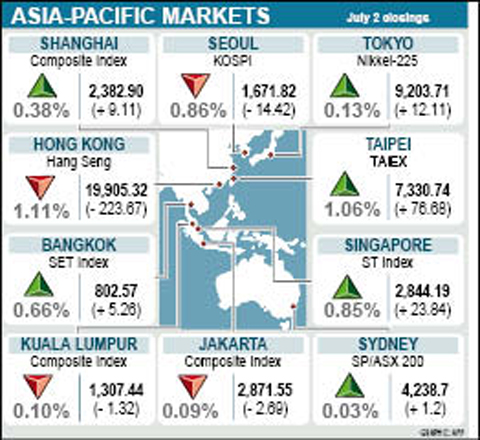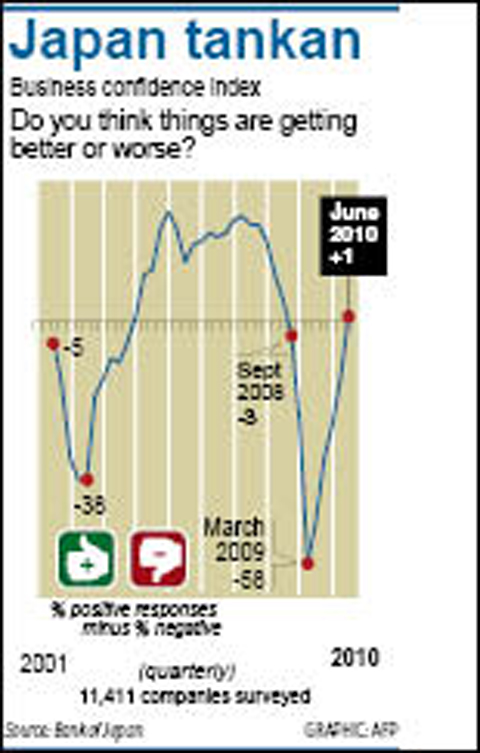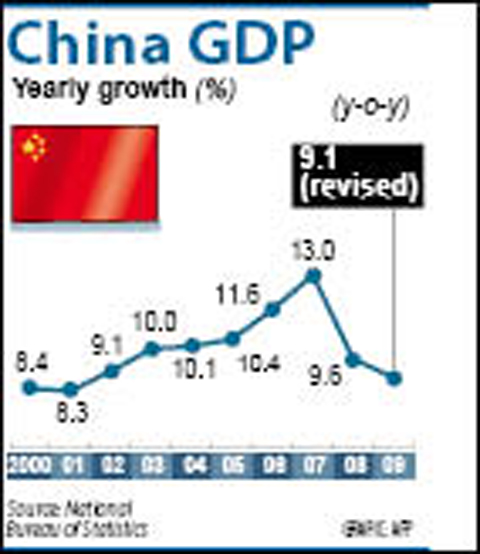Asian stocks fell, dragging the MSCI Asia-Pacific Index to its fourth weekly decline in five, as weaker manufacturing growth in the US, Europe and China added to signs global economic recovery is faltering.
The MSCI Asia-Pacific Index fell 3.4 percent to 111.70. The gauge has slumped 7.3 percent this year amid concerns Europe’s debt crisis and Chinese steps to curb property prices will hurt global growth.
The Shanghai Composite Index declined 6.7 percent, the biggest decline among benchmark indices in the Asia-Pacific after the New York-based Conference Board revised down an estimate for China’s growth and the country’s manufacturing expanded at a slower-than-expected pace.

China’s manufacturing growth slowed more than economists forecast last month, data released on Thursday showed. The Conference Board on June 29 corrected down its April gauge for China’s economic outlook due to a calculation error.
Goldman Sachs Group Inc on Friday cut its real GDP growth forecast for China this year to 10.1 percent from 11.4 percent, joining BNP Paribas, Macquarie Securities Ltd and China International Capital Corp in doing so.
Taiwan’s TAIEX closed up 1.05 percent on Friday on a technical rebound led by the financial sector, after a 3.3 percent fall posted in the previous three sessions amid concerns over the global economy, dealers said.

The TAIEX rose 76.68 points to 7,330.74, after moving between 7,285.01 and 7,378.77.
Hong Kong’s Hang Seng Index slipped 3.8 percent. Foxconn International Holdings Ltd (富士康控股), the world’s biggest contract maker of mobile phones, tumbled 13.3 percent after predicting a wider first-half loss.
Foxconn, controlled by Taiwan’s Hon Hai Precision Industry Co (鴻海精密), slumped 13.3 percent to HK$4.88, the third-biggest decline on the MSCI Asia-Pacific Index. The company said on June 29 its first-half loss would widen in part because of lower prices for its products and higher depreciation expenses.

Japan’s Nikkei 225 Stock Average lost 5.5 percent, after the yen strengthened for a fourth week, dragging shares of Japanese exporters such as Canon Inc and Sony Corp lower.
Other markets on Friday:
Manila fell 0.73 percent, or 24.28 points, from Thursday to 3,290.98, following Wall Street.
Wellington closed up 0.15 percent from Thursday in its first gain in seven trading days, although the mood remained cautious.
New Zealand’s benchmark NZX-50 index rose 4.29 points to 2,938.11.
Jakarta lost 2.69 points, or 0.09 percent, from Thursday to 2,871.55 as foreign funds sold select consumer and financial stocks after higher-than-expected inflation data for last month raised fears of a rate hike.
Mumbai fell 0.28 percent from Thursday as investors unwound positions ahead of the weekend, awaiting the US jobs data. The benchmark 30-share SENSEX index closed down 48.38 points at 17,460.95.

CROSS-STRAIT TENSIONS: MOFA demanded Beijing stop its military intimidation and ‘irrational behavior’ that endanger peace and stability in the Indo-Pacific region The Presidential Office yesterday called on China to stop all “provocative acts,” saying ongoing Chinese military activity in the nearby waters of Taiwan was a “blatant disruption” of the “status quo” of security and stability in the Indo-Pacific region. Defense officials said they have detected Chinese ships since Monday, both off Taiwan and farther out along the first island chain. They described the formations as two walls designed to demonstrate that the waters belong to China. The Ministry of National Defense yesterday said it had detected 53 military aircraft operating around the nation over the past 24 hours, as well

‘LAGGING BEHIND’: The NATO secretary-general called on democratic allies to be ‘clear-eyed’ about Beijing’s military buildup, urging them to boost military spending NATO Secretary-General Mark Rutte mentioning China’s bullying of Taiwan and its ambition to reshape the global order has significance during a time when authoritarian states are continuously increasing their aggression, the Ministry of Foreign Affairs (MOFA) said yesterday. In a speech at the Carnegie Europe think tank in Brussels on Thursday, Rutte said Beijing is bullying Taiwan and would start to “nibble” at Taiwan if Russia benefits from a post-invasion peace deal with Ukraine. He called on democratic allies to boost defense investments and also urged NATO members to increase defense spending in the face of growing military threats from Russia

LEAP FORWARD: The new tanks are ‘decades more advanced than’ the army’s current fleet and would enable it to compete with China’s tanks, a source said A shipment of 38 US-made M1A2T Abrams tanks — part of a military procurement package from the US — arrived at the Port of Taipei early yesterday. The vehicles are the first batch of 108 tanks and other items that then-US president Donald Trump announced for Taiwan in 2019. The Ministry of National Defense at the time allocated NT$40.5 billion (US$1.25 billion) for the purchase. To accommodate the arrival of the tanks, the port suspended the use of all terminals and storage area machinery from 6pm last night until 7am this morning. The tanks are expected to be deployed at the army’s training

TECH CONFERENCE: Input from industry and academic experts can contribute to future policymaking across government agencies, President William Lai said Multifunctional service robots could be the next new area in which Taiwan could play a significant role, given its strengths in chip manufacturing and software design, Taiwan Semiconductor Manufacturing Co (TSMC, 台積電) chairman and chief executive C.C. Wei (魏哲家) said yesterday. “In the past two months, our customers shared a lot of their future plans with me. Artificial intelligence [AI] and AI applications were the most talked about subjects in our conversation,” Wei said in a speech at the National Science and Technology Conference in Taipei. TSMC, the world’s biggest contract chipmaker, counts Nvidia Corp, Advanced Micro Devices Inc, Apple Inc and